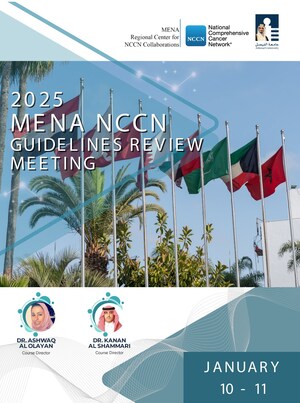PLYMOUTH MEETING, Pa., Sept. 8, 2020 /PRNewswire/ -- New international research in the September 2020 issue of JNCCN—Journal of the National Comprehensive Cancer Network adds important knowledge about how immunotherapy-related adverse events (irAEs) can impact more than one organ in a single patient. This study provides new information on how frequently multiple organ side effects occur, and reveals that multi-organ irAEs are more likely to happen sequentially rather than simultaneously.
"Multi-organ irAEs are under-recognized, under reported, and their pathophysiology is poorly understood," said lead researcher Ganessan Kichenadasse, MBBS, FRACP, Flinders Centre for Innovation in Cancer, Flinders University, in Bedford Park, Australia. "We need a concerted international effort to improve our understanding and help identify predisposing factors and prevention strategies. Treating teams should be aware of the potential for irAEs which affect multiple organs and institute plans for recognizing and managing them."
The researchers evaluated the incidence and patterns of multi-organ irAEs using individual patient data from four non-small cell lung cancer trials where patients were treated with atezolizumab, a PD-L1 inhibitor. Those four studies, known as OAK, POPLAR, BIRCH, and FIR, include investigators from around the world. Out of 1,548 patients worldwide, 27% experienced at least one adverse event; 5.4% experienced multi-organ irAEs. Skin, laboratory, endocrine, neurologic and pulmonary abnormalities represented the most common organ systems involved.
Among the 84 cases with multi-organ irAEs, 70 patients (83.3%) had two organ systems affected, 13 (15.5%) had three, and one patient had four systems affected. 86% of multi-organ irAE patients experienced these side-effects sequentially rather than concurrently. According to the results, multi-organ irAEs were generally amenable to satisfactory management, and their occurrence was associated with better overall survival rates.
"Based on the mechanisms of action for these immune checkpoint agents, tumor response and irAEs are likely to have a common pathophysiology," said Dr. Kichenadasse. "There is also probably a cumulative immune activation with every dose of immunotherapy, meaning lengthier treatment could lead to both better survival and added organ damage. However, it is important to highlight that this analysis was exploratory and hypothesis generating; these results need to be confirmed through additional research."
"This study confirms that more than one organ, at the same time or sequentially, can be affected by immune-related adverse events from checkpoint inhibitor therapy," commented Igor Puzanov, MD, MSci, FACP, Professor of Medicine, Director of the Early Phase Clinical Trials Program and Chief of Melanoma at Roswell Park Comprehensive Cancer Center, who was not involved in this study. "This is worth noting for all practicing oncologists and other specialists taking care of patients who are receiving these therapies. The silver lining here is the seemingly improved overall survival we see among these patients."
To read the entire study and a related commentary, visit JNCCN.org. Complimentary access to "Multiorgan Immune-Related Adverse Events During Treatment With Atezolizumab" and "Immune Related Adverse Events: Implications for Immune Checkpoint Inhibitor Therapy" is available until December 10, 2020.
JNCCN Impact Factor Reaches New Record
The impact factor for JNCCN has risen from 7.570 to 9.316. It now ranks 21 out of 244 oncology journals measured, and in the top quartile for all medical journals worldwide. According to Clarivate Analytics, research published in JNCCN was cited a total of 2,534 times in 2017 and 2018.
About JNCCN—Journal of the National Comprehensive Cancer Network
More than 25,000 oncologists and other cancer care professionals across the United States read JNCCN—Journal of the National Comprehensive Cancer Network. This peer-reviewed, indexed medical journal provides the latest information about innovation in translational medicine, and scientific studies related to oncology health services research, including quality care and value, bioethics, comparative and cost effectiveness, public policy, and interventional research on supportive care and survivorship. JNCCN features updates on the NCCN Clinical Practice Guidelines in Oncology (NCCN Guidelines®), review articles elaborating on guidelines recommendations, health services research, and case reports highlighting molecular insights in patient care. JNCCN is published by Harborside. Visit JNCCN.org. To inquire if you are eligible for a FREE subscription to JNCCN, visit http://www.nccn.org/jnccn/subscribe.aspx. Follow JNCCN on Twitter @JNCCN.
About the National Comprehensive Cancer Network
The National Comprehensive Cancer Network® (NCCN®) is a not-for-profit alliance of leading cancer centers devoted to patient care, research, and education. NCCN is dedicated to improving and facilitating quality, effective, efficient, and accessible cancer care so patients can live better lives. The NCCN Clinical Practice Guidelines in Oncology (NCCN Guidelines®) provide transparent, evidence-based, expert consensus recommendations for cancer treatment, prevention, and supportive services; they are the recognized standard for clinical direction and policy in cancer management and the most thorough and frequently-updated clinical practice guidelines available in any area of medicine. The NCCN Guidelines for Patients® provide expert cancer treatment information to inform and empower patients and caregivers, through support from the NCCN Foundation®. NCCN also advances continuing education, global initiatives, policy, and research collaboration and publication in oncology. Visit NCCN.org for more information and follow NCCN on Facebook @NCCNorg, Instagram @NCCNorg, and Twitter @NCCN.
Media Contact:
Rachel Darwin
267-622-6624
[email protected]
SOURCE National Comprehensive Cancer Network

Related Links
WANT YOUR COMPANY'S NEWS FEATURED ON PRNEWSWIRE.COM?
Newsrooms &
Influencers
Digital Media
Outlets
Journalists
Opted In





Share this article